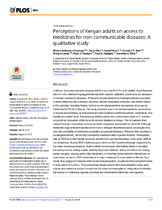| dc.description.abstract | In Kenya, noncommunicable diseases (NCDs) account for 27% of all deaths. Adult Kenyans
have an 18% chance of dying prematurely from cancers, diabetes, cardiovascular diseases
or chronic respiratory diseases. A Novartis Access Initiative is making medicines available
to treat cardiovascular diseases, diabetes, chronic respiratory diseases, and breast cancer
in 30 countries, including Kenya. Little is known about patients' perceptions of access to
medicines for NCDs in Kenya. The study objective was to understand patients' perceptions
of access to medicines; as well as barriers and facilitators at the household, community, and
healthcare system level. A baseline qualitative study was conducted in eight of 47 counties
as part of an evaluation of the Novartis Access Initiative in Kenya. The 84 patients interviewed
through a household survey had been diagnosed and treated for an NCD. Although
medicines at government facilities were free or cheaper than those sold in private pharmacies,
the availability of medicines presented a constant challenge. Patients often resorted to
private pharmacies, where NCD medicines cost more than at public facilities. Participants
with an NCD took their health seriously and strove to get the medicines, even under difficult
circumstances. Buying NCD medicines put a strain on the household budget, especially for
the lower-income participants. Some actions to overcome affordability barriers included:
borrowing money, selling assets, seeking help from relatives, taking on extra work, buying
partial dosages, leaving without the medicines, or resorting to non-medical alternatives. In
conclusion, access to NCD medicines is a major challenge for most adults in Kenya. As a
result, they engage in complex interactions between public, private facilities and pharmacies
to overcome the barriers. The government should ensure well-stocked public sector pharmacies
and subsidize prices of medicines for lower-income patients. Integration of industryled
access to medicine programs may help governments to obtain low cost supplies. | en_US |

